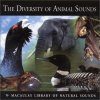![The Diversity of Animal Sounds The Diversity of Animal Sounds]()
Click to have a closer look
About this product
Customer reviews
Related products
About this product
Is there a stranger sound on earth than the song of the Capuchinbird? A sound more evocative than a Humpback Whale's serenade? More thrilling than the growl of an American Alligator, more melancholy than the wail of a Common Loon? A new CD from the Cornell Lab of Ornithology lets the listener decide.
The Diversity of Animal Sounds, produced by the Cornell Lab's world-renowned Macaulay Library of Natural Sounds and Animal Behavior (MLNS), is a "greatest hits" audio guide to some of nature's most spectacular songs, calls, and other animal sounds from across the globe. In addition to recordings of familiar mammals such as lions, monkeys, and elephants, the CD includes the sounds of birds, insects, frogs, and other creatures most people may not have heard of. After listening to the voices on this soundtrack, they will likely never forget them.
The audio guide is accompanied by a 28-page booklet that puts each of the sounds in its behavioral context, such as when it is used to attract a mate or defend a territory. Summaries explain how factors such as an animal's anatomy and physical environment affect the kinds of sounds animals use and the ways in which they use them. For example, many forest birds sing long, pure tones to minimize distortion caused when the sounds echo off forest trees, while prairie species often produce rapid songs interspersed with short notes, to take advantage of the open habitat.
Several of the recordings serve as a reminder of what can happen when humans take the animal sounds around them for granted. The calls of the Ivory-billed Woodpecker, for example, can no longer be heard in the United States; destruction of old-growth river forests led to the species' extinction everywhere except, perhaps, in Cuba. The Kauai Oo, a bird native to Hawaii, has also been silenced by extinction. The CD captures the voices of both these species, as sad reminders of the importance of paying attention to the animal voices around us.
The soundtrack does not include species announcements, allowing the listener to enjoy the experience without interruption by the human voice.
Customer Reviews



























